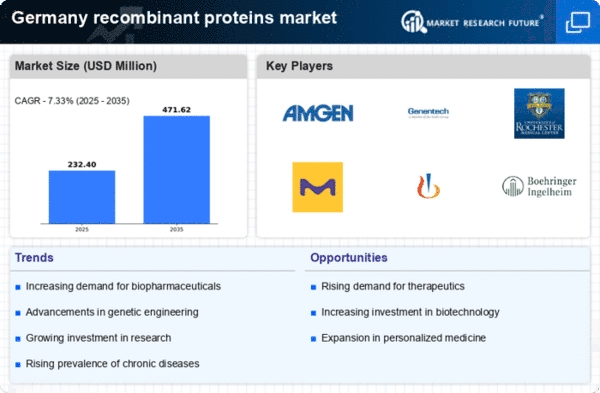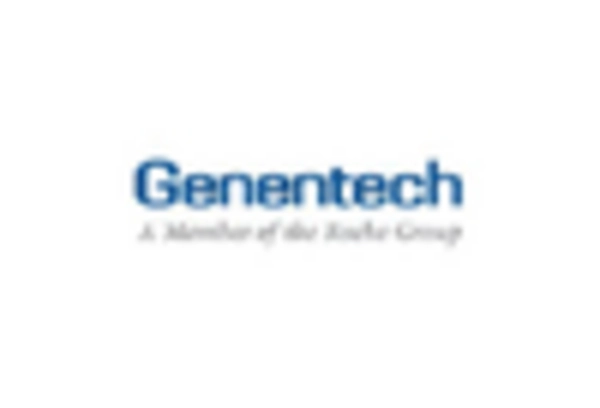Rising Prevalence of Chronic Diseases
The increasing prevalence of chronic diseases in Germany is a critical driver for the recombinant proteins market. Conditions such as diabetes, cancer, and autoimmune disorders are on the rise, necessitating effective therapeutic solutions. According to recent health statistics, chronic diseases account for nearly 70% of all deaths in Germany, highlighting the urgent need for advanced treatment options. Recombinant proteins, known for their efficacy and specificity, are becoming essential in managing these conditions. As healthcare providers seek innovative therapies to address this growing health crisis, the demand for recombinant proteins is expected to escalate, further propelling the market forward.
Growing Demand for Personalized Medicine
The growing demand for personalized medicine is emerging as a significant driver for the recombinant proteins market in Germany. As healthcare shifts towards more individualized treatment approaches, the need for tailored therapies is becoming increasingly apparent. Recombinant proteins, with their ability to be engineered for specific patient needs, are well-positioned to meet this demand. In 2025, the personalized medicine market in Germany is projected to reach €15 billion, with recombinant proteins playing a crucial role in this transformation. This trend indicates a shift in how therapies are developed and administered, potentially leading to improved patient outcomes and a more efficient healthcare system.
Supportive Government Policies and Funding
Supportive government policies and funding initiatives are playing a pivotal role in shaping the recombinant proteins market in Germany. The government has implemented various programs aimed at promoting biotechnological research and development, which includes substantial financial support for projects focused on recombinant proteins. In 2025, government funding for biotechnology is expected to exceed €1 billion, facilitating advancements in this sector. These initiatives not only encourage innovation but also attract foreign investment, thereby enhancing the competitive landscape of the recombinant proteins market. The favorable regulatory environment further bolsters the growth prospects of this industry.
Increasing Investment in Biopharmaceuticals
The recombinant proteins market in Germany is experiencing a surge in investment, particularly in the biopharmaceutical sector. This trend is driven by the growing recognition of the therapeutic potential of recombinant proteins in treating various diseases. In 2025, the biopharmaceutical industry in Germany is projected to reach a market value of approximately €40 billion, with recombinant proteins constituting a significant portion of this growth. The influx of funding from both public and private sectors is likely to enhance research and development activities, thereby accelerating the introduction of innovative recombinant protein therapies. This investment climate not only fosters technological advancements but also strengthens the overall infrastructure supporting the recombinant proteins market.
Technological Advancements in Protein Engineering
Technological advancements in protein engineering are significantly influencing the recombinant proteins market in Germany. Innovations such as CRISPR gene editing and advanced expression systems are enhancing the efficiency and yield of recombinant protein production. These technologies enable the development of more effective and targeted therapies, which are crucial in addressing complex diseases. In 2025, it is estimated that the market for recombinant proteins will grow at a CAGR of approximately 8%, driven by these technological breakthroughs. As research institutions and biopharmaceutical companies continue to adopt these cutting-edge techniques, the recombinant proteins market is likely to witness substantial growth and diversification.
















